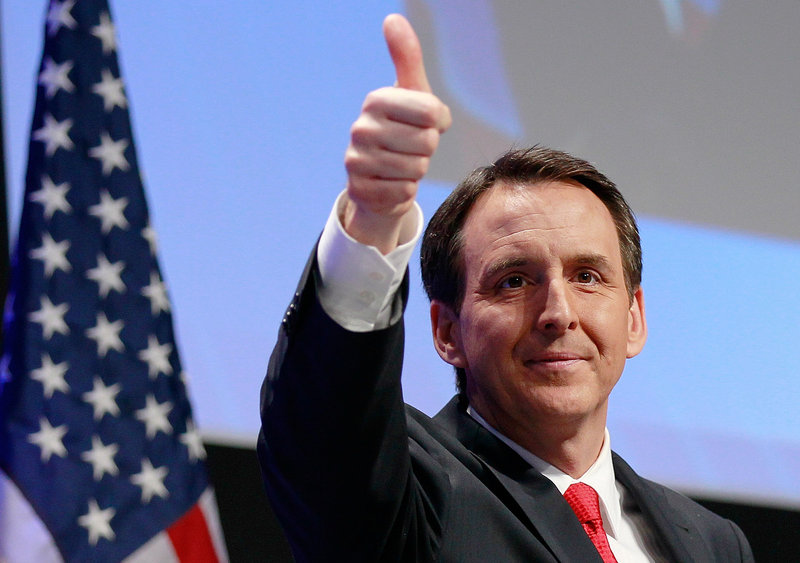WASHINGTON – Republicans who want to make Barack Obama a one-term president are promising big changes should the GOP win the White House in 2012.
“Economic growth, job creation, smaller government, less spending, lower taxes, rational regulation and a stronger presence in the world,” as Mississippi Gov. Haley Barbour put it Saturday.
These grandiose pledges sell well to the die-hard conservatives who play an outsized early role in determining the GOP nominee.
But would — could — Republicans do all they say? Probably not.
The realities of governing often conflict with the rhetoric of campaigning. Just ask Obama, who often says: “Change is hard.”
Obama had some major achievements in his first two years, including the new health care law. But he failed to make good on other campaign promises — closing the Guantanamo Bay prison for suspected terrorists, for example.
Now in charge of the House, Republican leaders are discovering for themselves that it’s not easy to keep pledges made in the heat of a campaign.
They said last fall they would cut $100 billion from the federal budget. Once put into power, they soon scaled back their goal, a concession to the difficulty of slicing into pet projects.
Under pressure now from freshman lawmakers backed by the tea party, they’re trying to stick to their original goal.
Countless factors play into the success or failure of making campaign agendas reality after an election.
But all that was lost on the Republican presidential wannabes who auditioned before more than 10,000 people at this weekend’s Conservative Political Action Conference, the largest such gathering of the year so far and the unofficial kickoff of the 2012 GOP nomination fight.
One by one, GOP hopefuls sketched out a broad vision of America under Republican rule, hoping to woo conservatives whose support is critical. There was little daylight on the major policy issues. Most emphasized longtime conservative tenets — lower taxes, smaller government, a strong defense — and called for scrapping Obama’s health care plan.
“We need to restore American confidence, American optimism, and America’s hope for the future. We need to restore the American dream by restoring American common sense,” said former Minnesota Gov. Tim Pawlenty, a pitch he seemed to acknowledge was lofty. “None of this is going to be easy,” he added.
Still, all suggested they’d bring wholesale change. They found time to bash Obama in the process.
“It’s going to take more than new rhetoric to put Americans back to work — it’s going to take a new president,” former Massachusetts Gov. Mitt Romney said.
So how would Romney bring jobs back and turnaround the economy?
He didn’t spell it out, saying only: “The right answer is to believe in America — to believe in free enterprise, capitalism, limited government, federalism — and to believe in the Constitution, as it was written and intended by the founders.”
South Dakota Sen. John Thune suggested overhauling Social Security, Medicare and Medicaid, and changing how business is done in the partisan capital by ending “backroom deals and big government ways.”
He ignored the fact that others before him have tried — and failed.
Details, to be sure, will come over the next year. No Republican has announced a candidacy, although several are gearing up. Once they do, the pressure for specifics will increase.
Several, including Indiana Gov. Mitch Daniels and Mississippi Gov. Haley Barbour, used examples from their states to explain how they would shift the country to more conservative governance.
Aware of the heavy lifting needed, Daniels told an audience demanding purity in their candidates: “We must unify America, or enough of it, to demand and sustain the big change we propose.”
Others started to try to distinguish themselves from the pack with proposals that at first blush seem extraordinarily difficult — if not unlikely — to accomplish.
Former House Speaker Newt Gingrich called for replacing the Environmental Protection Agency — “made up of self-selected bureaucrats, who are anti-American jobs, anti-American business, anti-state government, anti-local control” — with an agency focused on environmental and energy solutions.
One-upping Gingrich was former New Mexico Gov. Gary Johnson. He pledged to legalize marijuana.
Send questions/comments to the editors.



Success. Please wait for the page to reload. If the page does not reload within 5 seconds, please refresh the page.
Enter your email and password to access comments.
Hi, to comment on stories you must . This profile is in addition to your subscription and website login.
Already have a commenting profile? .
Invalid username/password.
Please check your email to confirm and complete your registration.
Only subscribers are eligible to post comments. Please subscribe or login first for digital access. Here’s why.
Use the form below to reset your password. When you've submitted your account email, we will send an email with a reset code.